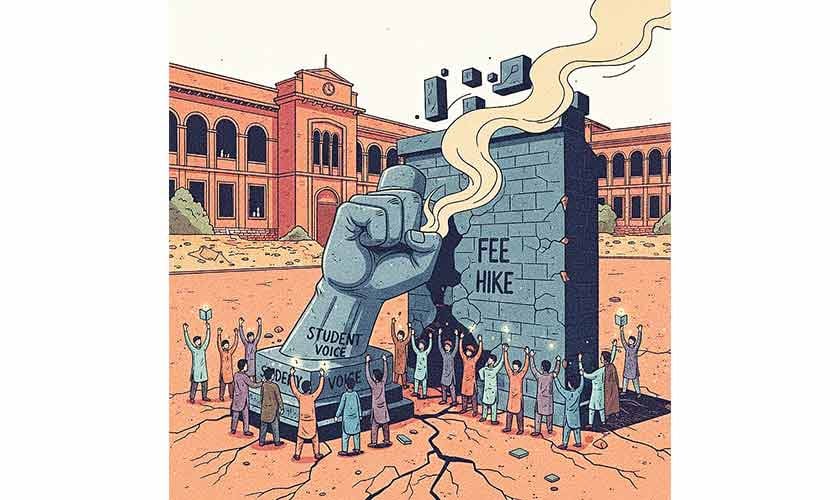The quiet on the University of the Punjab premises is menacing. It serves as an unsettling reminder of the conflict brewing between the students and the varsity administration over the recent fee hike.
On September 24, the administration took a hard stance against the protesting students. This disciplinary action, which included fines and probation, has ignited a debate over who is to blame for the campus unrest.
Spokesperson for PU, Dr. Khurram Shehzad, confirmed that 37 students were facing disciplinary action for violating university rules. Of these, 21 were fined Rs 20,000 each for their alleged involvement in agitation and violence. Fifteen others were placed on a three-month probation. Additionally, one student’s result was withheld, and another was banned from entering the campus altogether.
According to Dr. Shehzad, the goal is to restore order and nudge students towards responsible behavior through a combination of penalties and counseling.
### Student Groups Speak Out
The Islami Jamiat Talaba (IJT), one of the most active student groups at PU, views the situation as a campaign to suppress their voice. They contend that the administration is targeting them for speaking out against what they call an indiscriminate increase in tuition and hostel fees.
The group argues that the university is prioritizing revenue over the needs of students from middle-class backgrounds. Highlighting the financial strain, an MPhil student from the Department of Development Communication revealed that hostel fees had doubled from Rs 24,000 in 2024 to Rs 48,000 in 2025. The tuition fee has also seen a significant increase, he added.
Reiterating their stance, the IJT insists that while the university claims to focus on discipline, it is, in reality, prioritizing revenue at the expense of students.
### Administration’s Defense
Defending the fee hike, Dr. Shehzad explained, “Back in 2000, a student enrolling in an MSc programme would have to pay Rs 1,200 per year only. That fee remained unchanged for a long time, but this was not sustainable.” He admitted that due to no adjustments for many years, the recent fee hike feels sharp.
Providing context for the university’s financial pressures, the spokesperson noted that a major source of revenue—fees from private students taking BA and BSc exams—had been eliminated due to a policy change. At the same time, government funding for higher education has been reduced drastically, shrinking from around Rs 100 billion in 2017 to about Rs 60 billion today.
He also pointed out that the university’s hostels have been operating at a loss, offering accommodation at a fraction of the market rate—a model that is not sustainable in the long term.
### Issues Beyond Fees
Dr. Shehzad also mentioned PU’s recent drive to remove illegal occupants from university property. He said that land worth billions of rupees had been successfully reclaimed, and as a result, several boys’ hostels were converted into facilities for girls.
Speaking with *The News on Sunday*, Mehr Zain, the IJT nazim for Old Campus, said that while the IJT initially supported the drive, the administration later refused to provide rooms to legitimate occupants, including out-of-town students enrolled in evening programs. Mehr Zain believes the university’s record revenue is proof of a profit-driven motive.
The dispute extends beyond fees, involving accusations of excessive policing and suppression of free expression. Fasih-ur Rehman, the IJT spokesperson for PU, claimed that the university frequently allows police on campus to quell even neutral events. He cited an instance where students were questioned for participating in a peaceful *Defend Pakistan* rally.
### Conflicting Accounts of Recent Events
The two sides also offer conflicting accounts of a recent Students Rights March. The IJT claims their peaceful march was blocked by armed security guards, leading to a scuffle. On the other hand, the administration says the IJT’s true motive is to get their approximately 100 expelled activists reinstated.
The administration alleges that IJT members were involved in illegal activities such as renting out hostel rooms and receiving free services. According to officials, the group is lashing out after losing these privileges.
### The Impact on Regular Students
As the deadlock continues, caught in the middle are PU’s regular students who face uncertainty and tension on campus. With protests, disciplinary actions, and financial pressures ongoing, the university atmosphere remains fraught, leaving many students anxious about their academic futures and day-to-day campus life.
—
The ongoing conflict highlights the broader challenges facing higher education institutions trying to balance financial sustainability with accessibility and student welfare. How the University of the Punjab moves forward will be critical not only for its students but for the reputation of public higher education in the country.
https://www.thenews.com.pk/tns/detail/1346832-institutional-conflict
